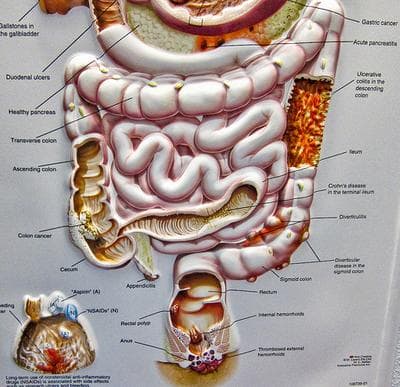Advertisement
Why I Love Colonoscopies (And You Should Too)

"Got a match? Yeah, your face and my, um, backside.”
That old insult comes to mind every time someone takes me aside to tell me they finally got a long-overdue colonoscopy or just scheduled one for a loved one. It happens all the time.
Ever since I was diagnosed and successfully completed eleven months of treatment for colorectal cancer at Massachusetts General Hospital, I feel like I’ve become a walking, talking reminder about the importance what The New York Times recently termed cancer’s “most unloved screening test.”
My face reminds friends, family members, colleagues and acquaintances to think about protecting their bottoms; it’s a role I’ve come to relish.
Just last month, a study in the New England Journal of Medicine proved what doctors have long suspected; that mortality is reduced by a whopping 53 percent in those who undergo colonoscopies and have pre-cancerous growths removed. It’s the strongest evidence yet that colonoscopies save lives. Despite the success of early detection and the steadily climbing cure rate of colorectal cancers in the past twenty years, only sixty percent of eligible adults get a colonoscopy, according to the American Cancer Society.
Okay, I’ll say it. That really bums me out.
March is Colorectal Cancer Awareness Month. With all due respect to the folks who work hard on the cause, you’d never know it. There’s no little ribbon or bracelet. It’s a tough disease to build a cute little symbol around, I’ll concede.
And that’s too bad, because when polyps are detected and removed during routine colonoscopies, would-be patients are spared long, tough battles. Undetected and untreated polyps can lead to death.
When I walked into my doctor’s office about a year ago complaining of stomach pain, excessive gas and changing bathroom habits, cancer was the last thing on my mind. I figured I was going to have to cut out milk or wheat. Instead, I got an on-the-spot diagnosis: cancer. I was 46 and the mother of four.
I was not a typical colorectal cancer patient. This year 143,000 new cases will be diagnosed, and 51,000 will die of the disease. The average age of onset is 64. Most people who are diagnosed have a family history of colorectal cancer and are of African American or Eastern European descent. I fit none of the criteria.
Despite the staggering statistics – both of the number of victims and the optimism surrounding early detection — people just don’t like talking about things like colons, rectums, intestines, bowels and colostomies. Yes, Katie Couric bravely endured a colonoscopy on national television to shed some light on the topic. But that was a dozen years ago now.
After my diagnosis, I told all but family members and a few close friends that I had colon cancer. But the 6 millimeter Stage 2b tumor was really on my rectum. Other patients with my diagnosis told me they did the same thing. Colon cancer was somehow easier on the ears and less gross than rectal cancer. Until I found out it was cancerous, I didn't give much thought to the rectum and what it actually does.
I was lucky. Chemotherapy and twenty eight sessions of radiation shrunk my tumor so much that there was barely anything left when the surgeon went in to remove it, along with twelve inches of colon. Because colorectal cancers can return, I spent last summer going through additional chemotherapy — an insurance policy to keep it at bay.
Another secret I kept was the ileostomy bag I wore under my clothes while my newly re-sected rectum healed. It has been reversed. While I can’t be considered “cured” for five years, my prognosis is excellent and I’m back to working, exercising and basking in my newfound role as a human reminder that colonoscopies save lives.
So make that appointment. Yes, the test is unpleasant. Of course, as anyone who’s had one knows, the actual test isn’t the hard part. It’s the preparation that’s a pain in the . . . well, you know.
Mary Mulkerin Donius lives in Hingham.
This program aired on March 22, 2012. The audio for this program is not available.
